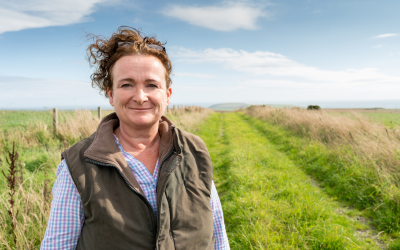Anne Ramsay
 “The OU was the only option ..... As I live in such a rural area it would not have been practical to travel 120 miles to Glasgow for lectures or tutorials.”
“The OU was the only option ..... As I live in such a rural area it would not have been practical to travel 120 miles to Glasgow for lectures or tutorials.”
Living in a rural community on the furthest south-western tip of Scotland did not prove a barrier to arts and humanities graduate Anne Ramsay, who began studying with The Open University in 2018.
“The OU was the only option for online learning. As I live in such a rural area it would not have been practical to travel 120 miles to Glasgow for lectures or tutorials”, says Anne who studied for her
Bachelor of Arts Honours degree alongside her job at Scotland’s five star Logan Botanic Garden, near Stranraer.
The 50-year-old did Economics at university straight from school. London and Manchester were home for 15 years, before she swapped city life and work for Dumfries and Galloway, and took up a job at the botanical garden.
The garden’s southerly location warmed by the Gulf Stream enjoys an almost subtropical climate enabling plants from Australia, New Zealand, South and Central America and Southern Africa to thrive, but it is also one of the more remote parts of mainland Scotland. But that did not stop Anne.
Study when suits
“Distance learning allowed me to fit in studying around work and family life," she says. “I was able to study when it suited me, in my own time and space.
“However, there were also tutorials which gave you the opportunity to speak with a tutor and also meet other students online in a small group.
I use transferable skills such as organisation skills and meeting deadlines.”
“The accessibility via the internet meant that it was so much easier to study remotely than it would have been even 10 years ago.”
Anne studied at her home, a former working farm in Scotland’s most southerly village Drummore, on her days off, in the evenings, and at weekends.
“There were many options for tutorials in the evenings and weekends which enabled people who work full time to fully benefit from all aspects of the OU course.
“My course was pretty separate from my work, although I use transferable skills such as organisation skills and meeting deadlines.”
Anne’s six modules included ‘Europe 1914-1989: war, peace, modernity’.
“I have always been interested in religion and history but never studied them apart from briefly at school,” she says.
“I decided to do my OU degree just out of interest and a love of learning. I think it is positive to keep learning new things especially as we get older.”
Student community
A love of the subject and being keen to learn more helped to keep Anne motivated. She also felt part of a student community.
...it was great to be able to share ideas and talk to people on the same course.”
“I didn't expect to, but with the internet and Facebook groups it was very easy to 'meet' with people on your course and in your wider area.
“Whilst you don't talk about specific answers to assignments, it was great to be able to share ideas and talk to people who were on the same course.”
Anne was also supported in her OU degree studies by husband Charles, and son Sam.
“A favourite module was Exploring Religion: places, practices, texts and experiences. This provided an alternative way of looking at different religions.
"It took an unusual perspective of studying religion, considering things such as what does religion taste like and what does it smell like!
“It led me to look at things in a different way and take a broader approach than a traditional study of religion.”
'So much to gain'
“Go for it!” says Anne to anyone thinking of OU studies. “You have nothing to lose and so much to gain, whether it be for personal learning, career progression or just general interest.
“The OU enables you to study in your own time and fits well with work and family commitments.
"You can become fully immersed in the material and the course even in the absence of face-to-face meetings.”
Photo by Martin McNae Photography